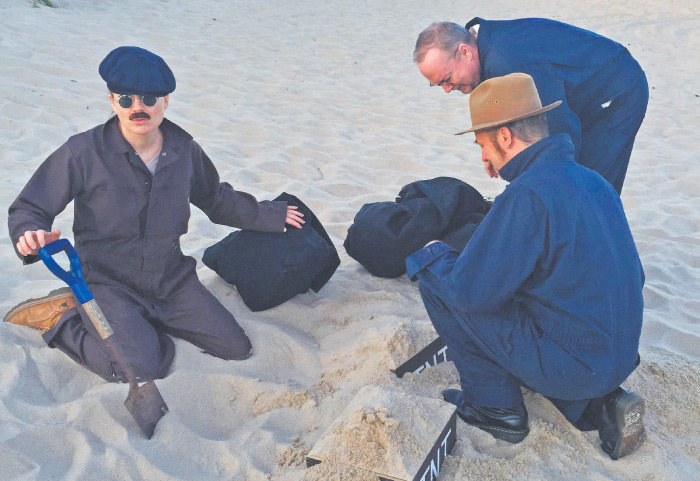Book & Song & Film: The Nazi Landing in Amagansett

Last week, Austria came within a hair of electing a fascist president who would have curtailed democracy in that country. England will vote next week to decide whether to leave the European Union. And elsewhere other democracies are frightened.
The cause of much of this, of course, is immigration from Muslim countries into Europe and elsewhere, largely because of the activities of radical Islam causing terror at home and abroad and tapping into the primal fear of democratic people everywhere.
“Just one more terrorist attack in England between now and their vote and they will be out of the European Union,” a friend told me.
This fear is also causing the rise of politicians in the United States who tap into that fear. The populace turns to someone who will build walls or send foreigners away to keep us safe. Freedom and democracy are temporarily shoved into the backseat. It leads to personal searches at airports, censorship, breaking into people’s homes at night, torture and sending people back to where they came from. Thus can democracy die.
For years here in America, we have wondered, particularly after 9/11, what it was that Al Queda or the Taliban or ISIS wants. They can’t beat us in a face-to-face war. What they can do is bring down democracies as fear pervades everywhere. And then these places become ripe for the dictatorships they espouse—beheadings come to mind—to keep the people in line.
There was a time, of course, when here in America our government dealt straight on with such threats. It became a fight to the death to preserve our freedoms. But during the fight, many freedoms were set aside.
It was World War II.
As a result, I have become fascinated by a particular incident that occurred in Amagansett in 1942, in the early days of that war. At the time newspapers were censored, people weren’t allowed out to the beaches at night, gasoline and rubber and tin and butter were rationed, and people had to watch what they said. “Loose Lips Sink Ships” was the motto on one particular poster. It was that time’s version of “See Something, Say Something.” There was a fight going on between good and evil.
What happened on June 13, 1942 is that a Nazi submarine surfaced just off Amagansett and the sailors onboard sent four Germans trained as terrorists ashore in a rubber boat. They had with them boxes of high explosives that they intended to use to attack factories, department stores, the New York City water supply, railroad stations and storage facilities. This was the first group expected to land. More groups of terrorists would come every six weeks for years to follow.
Had these terrorists been caught on the beach, they would have been shot on the spot. When they got inland and were rounded up, they were not arrested and put on trial as is our law of the land. They were not even given a military trial. Instead, they were presented to a “commission” headed up by generals who listened to testimony for a few days and gave their recommendation to President Roosevelt, who then decided that all of them were to be summarily executed in what would be the largest mass death sentence all on the same day in the history of this country.
The leader of the men did not get executed, however. He was sentenced to 30 years in prison. The reason stated was that he had given the Americans all sorts of German information that would help this country win the war. The President wanted to send a message to other terrorists. Come over to the bright side. You will be spared. Indeed, Hitler ordered the program cancelled.
One part of this story, however, particularly fascinated me. On the beach in Amagansett late that June night, the terrorists were seen by a 22-year-old American Coast Guardsman on patrol with a flashlight.
The leader of the terrorists, a man named George Dasch, was under orders to kill any American who stumbled upon what they were doing on the Amagansett beach that night, with the body taken back out to the sub for burial at sea. The killing was to be done by two German sailors who had rowed the terrorists to the beach. They each had submachine guns. When the Coast Guardsman appeared, they were right there on the shore by the inflatable, making sure everything went right.
But Dasch, instead of obeying orders, went over to the Coast Guardsman and told him he’d be killed if he came any closer. “Do you have a father?” he asked. “A mother? Do you want to see them again?”
Dasch then gave this young man money and told him to run for his life, which he did. Indeed, it was this Coast Guardsman who alerted everyone that something was afoot.
By that time, however, the Germans had snuck away to the Amagansett Railroad Station and got away to New York City. Twenty-four hours later, Dasch quietly went to the FBI’s New York office and let them know he would shortly be going to Washington to give the $1.3 million (in today’s money) in cash he had been given to run this terrorist operation for the next two years to J. Edgar Hoover himself. And then, with Dasch telling them what to do, the others came to be arrested by the agents of the FBI.
Numerous books have been written about this little-known incident. In them, George Dasch is presented as a turncoat, a squealer and a coward. It is said he had only decided to do this deed after realizing he’d made a huge mistake with the Coast Guardsman. The FBI wined him and dined him for six days in Washington, then arrested him and tried to have him executed with the others.
Roosevelt knew Dasch’s intentions but he could not buck public opinion, which wanted all the terrorists executed as soon as possible. So Roosevelt went along with the cover story about Dasch (under duress?) telling what he knew. And Dasch was spared. And never heard from again.
Dasch had come to America as a stowaway when he was a teenager. He’d married an American girl. He’d lived in New York for 20 years. And he’d gone back to Germany to see his family—he was one of 13 children born in Germany—before Pearl Harbor.
Here’s what really happened. I have done the research. And I have written a book about it.
“This is the story of a New York City waiter of German extraction who, finding himself in a jam in Berlin in 1942, is unable to get home and so must convince the German High Command to hire him to lead a terror operation to the United States which—once there—he intends to sabotage.”
The book is The Night the Nazis Landed and is represented by the Marianne Strong Literary Agency in Manhattan, and has been optioned for a motion picture by Emmy Award–winning filmmaker Cayman Grant, whose firm Steel Titans is based in Los Angeles.
If interested in any aspect of this, contact me or either of the above.
Incidentally, on Monday, June 13, beginning at 7 p.m., the Amagansett Life-Saving & Coast Guard Station Society is celebrating the 74th anniversary of the night the German saboteurs landed with a program of musical numbers from 1942 and the showing of the premiere of a film of a recent re-enactment of the landing by current-day citizens in costume. Also being shown will be archival film from 1942 about the Nazi landing, all on a giant movie screen on the lawn of the Amagansett Coast Guard Station, which is located near to where the landing took place. (The rain date is June 14.) It’s all free. And you’re invited.



